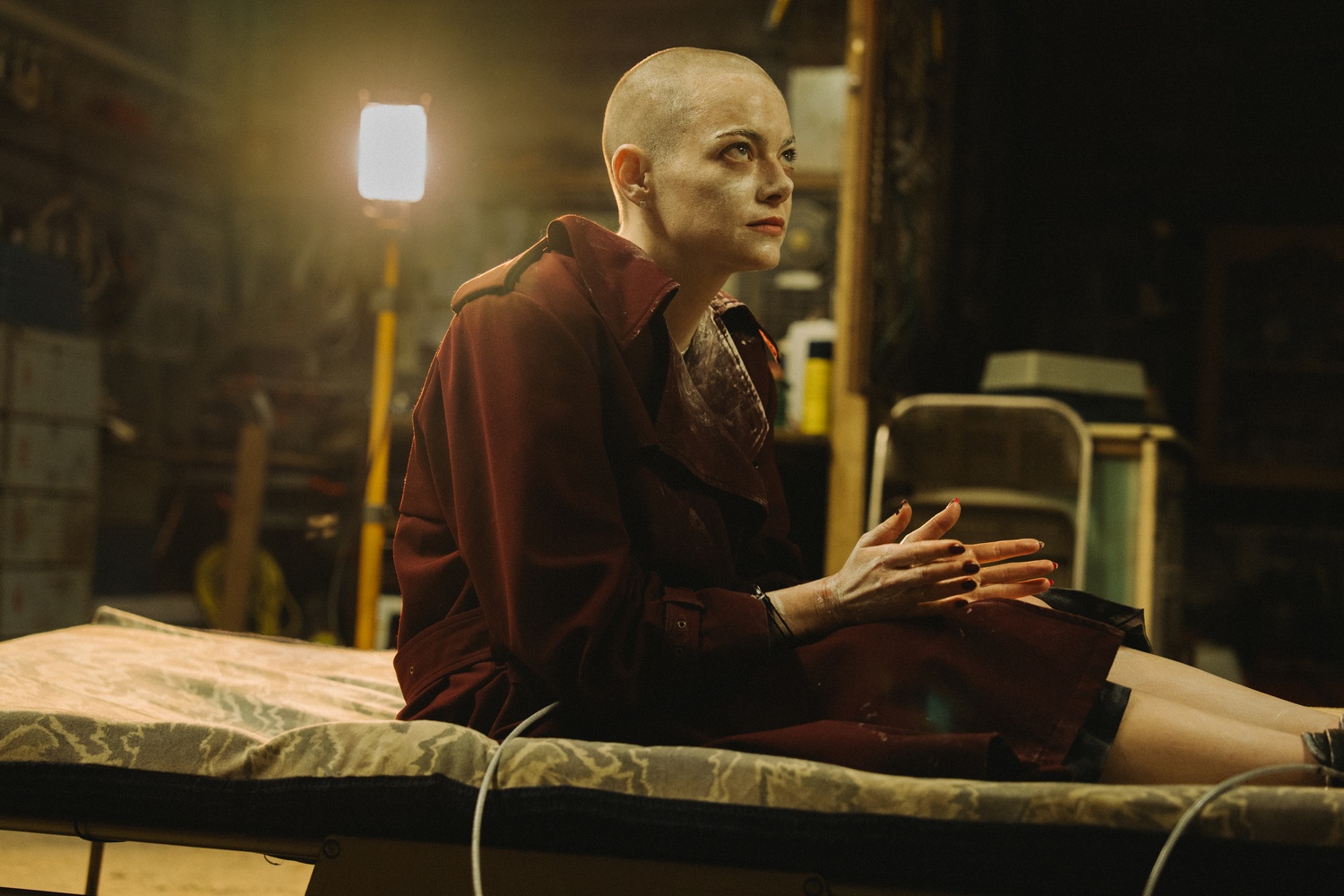
News
Summers Will Not Finish Semester of Teaching as Harvard Investigates Epstein Ties

News
Harvard College Students Report Favoring Divestment from Israel in HUA Survey

News
‘He Should Resign’: Harvard Undergrads Take Hard Line Against Summers Over Epstein Scandal

News
Harvard To Launch New Investigation Into Epstein’s Ties to Summers, Other University Affiliates

News
Harvard Students To Vote on Divestment From Israel in Inaugural HUA Election Survey
‘Bugonia’ Review: Yorgos Lanthimos’ Dialogue is Awkward and Brilliant
Dir. Yorgos Lanthimos — 4 Stars

“Stop saying ‘dialogue,’” Teddy (Jesse Plemons) snaps, “This isn’t ‘Death of a Salesman.’”
In “Bugonia,” Greek director Yorgos Lanthimos returns to the absurd and grotesque. His characters move and speak like figures from a Mannerist painting, slightly off-balance and overly rehearsed. He creates an effect of estrangement and parody that reveals the physical awkwardness of social performance, making it feel uncanny and foreign. The result is a film that leaves viewers feeling disoriented, detached from familiar human behavior. For most of the movie, the characters wear clothes that do not fit or belong to them. Their running — panting, unathletic — feels embarrassing, their stretches stiff.
“It all starts with something magnificent,” mutters Teddy in voice-over in the opening shot, a close-up of a bee pollinating. The film opens by showing what occupies Teddy’s time and mind: his meticulous calm as an apiarist, illustrated alongside his ramblings insisting aliens have infiltrated Earth. Teddy insists to his cousin Don (Aidan Delbis) that every loss, stroke of bad luck, and problem they cannot fix in their lives is the work of extraterrestrials who have condemned humans to “techno-enslavement.”
The film’s premise and conflict hinge on this impossible question: How can biomedical CEO Michelle Fuller (Emma Stone) convince Teddy that she is not an alien? Convinced he can save humanity, Teddy abducts her, believing she is an Andromedan — an alien species — in disguise. He can only understand his pain through blame, and corporate authority becomes the target.
“You are a high-ranking official of the Andromedan royal court,” Teddy accuses her. “You killed my family…You killed the bees.”
Unlike the baroque surrealism in Lanthimos’ previous films, “The Favourite” (2018) and “Poor Things” (2023), “Bugonia” roots itself in a recognizable present and mocks contemporary America. Lanthimos makes fun of our current moment with original humor. What could be more extreme than flat-earthers, 5G-tower alarmists fearing adverse health effects, or tinfoil hat wearers trying to block government mind-control? “Bugonia” answers that question with Teddy, whose worldview combines a cult of misinformation and climate grief.
Set in rural Georgia, the film depicts an American backdrop of invisibility, portraying Teddy’s warehouse shifts and basement living. Teddy’s ordinary existence is presumably filled with what he swears to abandon for his mission to save Earth from alien control: video games, vape clouds, and a sense of being left behind. “No one else sees it but me,” he insists about his laughably absurd story.
Teddy’s old house, with its deteriorating roof, stands in stark contrast to Michelle’s white, modern mansion of floor-to-ceiling windows, manicured bushes, and an indoor pool. Michelle, the owner of the biomedical corporation Auxolith, presides over the corporate town. Her portrait watches over break rooms. She, “in all humility,” can refer to Auxolith as the region's “economic engine.”
This image, which captures the positional difference between their homes and workplaces, carries into their language, shaped by the world that built them. Michelle speaks as if she were writing a formal email, performatively and with a certain emptiness. The mismatch between her professional tone and the circumstances makes her speech feel artificial. She defaults to the tone of corporate mediation, ripped straight from an HR seminar, that flattens even moments of fear under interrogation. “I hear where you’re coming from, but I respectfully disagree,” she says, “I would love to move forward now to a solution.” Lanthimos satirizes corporate culture’s hollow attempts to manage empathy through her vocabulary: comprised of words like “dialogue,” “unpack,” “safe space,” “honest talk,” and “in good faith.”
“Bugonia” marks the third collaboration between Lanthimos and Stone in less than three years. Having won the 2024 Oscar for Best Actress for her role in “Poor Things,” Stone delivers another performance defined by her fearless commitment to physicality, in limping movements and serious facial expressions. Stone understands Lanthimos’ script and his strange humor with precision. Here she appears as Michelle, with a shaved head and covered in antihistamine cream (to weaken her nervous system and “level the playing field”). This chemical coating, Teddy believes, will protect him from Michelle’s mind-controlling powers and potential communications with a mothership.
Plemons plays a child trying on adulthood, suspended between tantrum and revelation. He whines, tussles, and commands with awkward authority, still dependent even as he instructs Don, the only person who anchors him — he blames the Andromedans for taking away Don’s confidence. The two cling to each other and spin in circles, giggling as if the outside world does not exist. Every photograph in Teddy’s home frames him as an infant in his mother’s arms. In one surreal flashback, he holds his mother like a floating balloon.
The awkward, warped visuals build an uninhabitable world that extends Lanthimos’ project of estrangement. Shot on 35mm Kodak film, “Bugonia” radiates in a palette of reds, oranges, and browns, oversaturated to feel feverish. For action shots, the camera runs and moves with the characters, making the choreography feel uneasy. The wide-angle lenses trap characters into surreal, childlike distortion, where faces bulge and rooms feel claustrophobic. The shallow depth of field and close-ups accentuate anatomical details: nails, hairs, and bones. In this film, beauty and disgust coexist.
Lanthimos is back to his freakiest form. He makes his characters darkly funny and unsettling, caught between sincerity and absurdity. With extraordinary, unnerving performances by Plemmons and Stone, “Bugonia” is a must-watch for its originality and the rare sensation it provokes.
Want to keep up with breaking news? Subscribe to our email newsletter.
